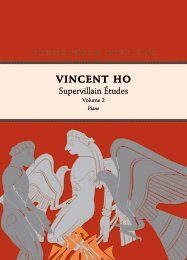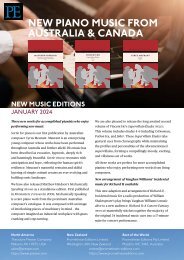Tetragrammaton
by Christos Hatzis | for Soprano and Digital Audio
by Christos Hatzis | for Soprano and Digital Audio
- No tags were found...
You also want an ePaper? Increase the reach of your titles
YUMPU automatically turns print PDFs into web optimized ePapers that Google loves.
Programme notes<br />
The composer writes:<br />
In everyday parlance, the English expression “four-letter word” has cheap<br />
and vulgar connotations, but in Greek, <strong>Tetragrammaton</strong> (Greek for “fourletter<br />
word”) is the Hellenistic term for the Hebrew name of God. The name<br />
itself, YAHWEH, has six letters, but in old Hebrew only the consonants,<br />
YHWH, were written down, hence the Greek name. The text of the piece is<br />
a compilation from the Book of Job of the Old Testament, specifically from<br />
“God’s answer to Job” (verses 38:4-18). The conclusion of the first stanza of<br />
the selected text (“when the<br />
morning stars sang together, as the wind announced upon the waters the<br />
glory of the coming of man”) is not a literal translation from the Bible, but<br />
is borrowed from Edgar Cayce, the 20th century American mystic, who has<br />
offered this poetic rendering while in trance on a number of occasions; the<br />
evocative and powerful character of this rendering made it impossible to<br />
resist its inclusion here.<br />
Before embarking on the composition of the piece and after reading<br />
the original text several times, I read Carl G. Jung’s “Answer to Job”, a<br />
remarkable work which Jung wrote towards the end of his life. Although<br />
I agree with Jung that the Book of Job is a turning point in the Hebrew<br />
concept of the Godhead and a founding stone for the subsequent advent<br />
of Christianity, I do disagree with his description of God’s answer to Job as<br />
pyrotechnics aimed mainly at impressing fear in Job and preventing him<br />
from questioning the Divine. To me the verses<br />
of the whole Book of Job and of that section in particular are<br />
sublime and of timeless beauty: they are just as inspiring and relevant<br />
today as when they were written. In setting these verses to music, I had<br />
no preconceived ideas about how the music should sound or evolve; I<br />
let the words take me wherever they wanted to go. I tried to create a<br />
“magical” context in which they could tell their own story without too much<br />
interference on my part.<br />
<strong>Tetragrammaton</strong> took me an unusually long time to compose; I worked on<br />
it on and off from May 1994 until February 1995. The years 1994 and 1995<br />
were a “testing” period for me, a midlife crisis if you like, which affected my<br />
work and my thinking<br />
about music, and <strong>Tetragrammaton</strong> along with some other works of the<br />
same period bear witness to my changing values, musical and otherwise. The<br />
common thread that permeats these works is the investigation of a situation<br />
where creativity is divorced from ego. In this process of soul searching, the<br />
Book of Job became a grand metaphor for a newly defined creativity. This<br />
book, like the parable of the Prodigal Son, is about a fundamental change<br />
in consciousness whereby an individual does not become creative through<br />
the solitary activity of “playing God”, but by the far more rewarding one of<br />
“playing (or co-creating) with God”.


















